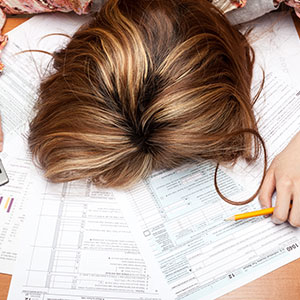Chapter 7 Exemption Rules
What Are The Chapter 7 Bankruptcy Exemption Rules For Virginia?
 Every householder in Virginia has an automatic exemption called a poor debtor’s exemption under Virginia Code Section 34-26. It is simply a list of things that you get to keep regardless of whether you file for bankruptcy. Everyone in Virginia is entitled to the poor debtor’s exemption, including millionaires and governors. You get to keep the family bible, wedding and engagement rings, family portraits and heirlooms up to $5,000 in value, a lot in a burial ground, all wearing apparel up to $1,000, all household furnishings up to $5,000, all guns up to $3,000, all animals owned as pets, medically prescribed health aids, tools of the trade up to $10,000, all motor vehicles up to $6,000, and you get to keep your tax refunds that are a result of the earned income credit or the child care credit. You also get to keep your rights to any child support that you are owed.
Every householder in Virginia has an automatic exemption called a poor debtor’s exemption under Virginia Code Section 34-26. It is simply a list of things that you get to keep regardless of whether you file for bankruptcy. Everyone in Virginia is entitled to the poor debtor’s exemption, including millionaires and governors. You get to keep the family bible, wedding and engagement rings, family portraits and heirlooms up to $5,000 in value, a lot in a burial ground, all wearing apparel up to $1,000, all household furnishings up to $5,000, all guns up to $3,000, all animals owned as pets, medically prescribed health aids, tools of the trade up to $10,000, all motor vehicles up to $6,000, and you get to keep your tax refunds that are a result of the earned income credit or the child care credit. You also get to keep your rights to any child support that you are owed.
In addition to those automatic exemptions, each householder who has been a resident of Virginia for more than two years has what is called a “homestead exemption”. It is kind of a wildcard exemption. “Homestead” has nothing to do with your home, owning a home, renting, or your house. However, if you have equity in your house, the homestead exemption would apply. This wildcard exemption is typically applied to any cash that you have in your pocket or money that you have in the bank, checking accounts, savings accounts, tax refunds that you may be expecting, cash value on a life insurance policy, watches or golf clubs. In other words, anything that is not otherwise exempt would fall under the homestead exemption. You simply have to file a homestead deed in the county in which you reside or where the property is located, and it usually costs $21. So, that is one of the costs in a Chapter 7 case. We get a lot of clients who have not resided in Virginia for two years, and if that is the case they are entitled to use the federal exemptions, which are pretty generous as well. I do not need to get into what they are, but their wildcard is $7,400. So, typically you do get to keep all your stuff in a Chapter 7 case.
So, the question about what kind of debt it is typically dischargeable is anything but those five categories; child or spousal support, fines and restitution in a criminal case, taxes, student loans and debts that are incurred by fraud. That debt is not forgiven. All other debts get discharged in a bankruptcy. A tax debt can only be discharged if it is income taxes that are more than three years old and the return was filed more than two years before the bankruptcy case is filed. You cannot get out of personal property tax. You cannot get out of 941 taxes if you have been a business owner. Another tax that you do not get out of is real estate taxes, but you should understand that real estate taxes follow the real estate, so if your house goes to foreclosure, the new owner has to pay any real estate taxes that are remain unpaid.
 Many people ask me, “Will they come to my house?” Absolutely not. The only time I have had a trustee come to a property is when there is non-exempt property to pick up and sell. In the last couple of months I had a business bankruptcy where the property was valuable commercial land, and was going to be sold at auction. In fact the auction just happened, and the successful bid for the property was much less than what the owner thought it was worth, but he is quite happy because it is going to pay off some of his debts. Basically, he has a lot of tax debt and this is going to help him out.
Many people ask me, “Will they come to my house?” Absolutely not. The only time I have had a trustee come to a property is when there is non-exempt property to pick up and sell. In the last couple of months I had a business bankruptcy where the property was valuable commercial land, and was going to be sold at auction. In fact the auction just happened, and the successful bid for the property was much less than what the owner thought it was worth, but he is quite happy because it is going to pay off some of his debts. Basically, he has a lot of tax debt and this is going to help him out.
I had a Chapter 11 that was converted to 7, and the trustee recognized that my client had several million dollar properties. He just wanted to come and look at the properties because he had been offered less than full value by a local developer. We said to the trustee, “Please don’t take this offer. Come see the property so you understand it’s worth more.” He paid a visit to the property.
So the answer to the question is, “what you will be able to keep in a Chapter 7”, for most people, is that you get to keep everything. But remember, “You pay you stay; you don’t you won’t!” Remember, you have to make your car payment and you have to make your house payment as well.
For more information on Chapter 7 Bankruptcy Exemption Rules, a free initial consultation is your next best step. Get the information and legal answers you are seeking by calling (540) 788-2273 today.

Please Call Us For A Free Strategy Session
(804) 417-4905 | (703) 664-1912 | (540) 788-2273
